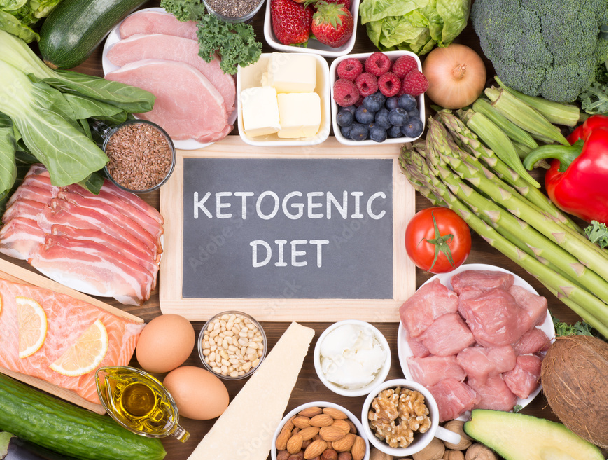Table of Contents
Introduction
The keto Diet Plan, commonly known as the keto diet, is a low-carbohydrate, high-fat diet that has gained popularity for its potential to promote weight loss, improve metabolic health, and provide other health benefits.
The primary goal of the keto diet is to induce a state called ketosis, in which the body shifts its primary fuel source from carbohydrates to fats. In this Article, we will explain the key principles, benefits, potential risks, and recommended foods of the keto diet plan.
Principle of Keto Diet Plan
It is important to limit carbohydrates to a very low level, usually between 20 and 50 grams daily, in order to follow a keto diet. This restriction puts the body into ketosis, a metabolic state in which the liver produces ketone bodies from fat.
These ketone bodies serve as the main energy source for the body and brain, replacing glucose from carbohydrates. A standard keto diet is usually 70-75% calories from fat, 20-25% protein, and 5-10% carbohydrates. This drastic reduction in carbohydrates helps regulate blood sugar levels and insulin secretion, which may benefit people with type 2 diabetes and insulin resistance.

What is Keto Diet Plan?
The keto Diet Plan is a low-carb, high-fat diet that has gained popularity for its potential benefits in weight loss, improved blood sugar control, and increased mental clarity.
The goal of the keto diet plan is to enter a state of ketosis, where the body primarily uses fats for energy instead of carbohydrates. Here’s a general outline of a keto diet plan:
High-fat Foods: Approximately 70-75% of your daily calories should come from healthy fats. Some examples including:
- Avocados and avocado oil
- Coconut oil and MCT oil
- Olive oil
- Butter and ghee
- Nuts and seeds (e.g., almonds, chia seeds)
- Fatty fish (e.g., salmon, mackerel)
- Cheese (moderate amounts)
- Eggs
Moderate Protein: About 20-25% of your daily calories should come from protein sources, including:
- Meat (e.g., beef, poultry)
- Fish and seafood
- Eggs
- Cheese
- Tofu and tempeh (for vegetarians)
Low-Carbohydrate Foods: Carbohydrates should be limited to about 5-10% of your daily calories. Focus on non-starchy vegetables and avoid high-carb foods, including:
- Bread and grains
- Potatoes and other starchy vegetables
- Rice, pasta, and other grains
- Sweets and sugary snacks
- Most fruits (small portions of berries are acceptable in moderation)
Hydration: Drink plenty of water throughout the day to stay hydrated and support overall health.

Supplements: Some people on the keto diet may need to supplement electrolytes (sodium, potassium, magnesium) due to increased water loss. Consult with a healthcare professional for personalized advice.
Meal Planning Breakfast Including:
- Eggs with avocado or a veggie omelet cooked in butter or coconut oil.
- Lunch: A salad with leafy greens, high-fat dressing, and protein (e.g., chicken, salmon).
- Dinner: Grilled or baked meat/fish with non-starchy vegetables cooked in healthy fats.
- Snacks: Cheese, nuts, seeds, or keto-friendly snacks.
Health Benefits of Keto Diet Plan
Weight loss: Ketosis can cause weight loss because the body uses fat stores for energy. Additionally, dieting can reduce appetite, resulting in reduced calorie intake.

Improve Metabolic Health: The keto diet has been shown to improve several metabolic health markers, including blood sugar, triglycerides, and HDL cholesterol. This is especially good for people with metabolic syndrome or obesity.
Improved mental performance and focus: Some people on the ketogenic diet have improved cognitive and mental performance, which may be because the brain uses ketones to get stronger.
Anti-inflammatory potential: A keto diet can reduce inflammation in the body, which has been linked to many chronic diseases.
Epilepsy Treatment: The ketogenic diet was developed for the treatment of epilepsy but is still used as a treatment option for epilepsy in some cases, especially in children.
Health Risk of Keto Diet Plan
Although the ketogenic diet has been shown to be beneficial for many, it may not be suitable for everyone and may need consideration:
Diet Food deficiency: Severe restriction of carbohydrates results in some vitamins, Minerals. lack. and fiber, which is mostly found in carbohydrate-rich foods such as fruits, vegetables, and whole grains.
Keto Flu: When transitioning to ketosis, some people experience flu-like symptoms such as fatigue, headaches, and irritability, including the “keto flu.”
Gastrointestinal Problems: Some people may experience digestive problems such as constipation due to low fiber intake.

Ketoacidosis (not to be confused with ketosis): Although very rare, people with diabetes or insulin-dependent diabetes should be careful because too many ketones in their blood sugar can cause a dangerous condition called ketoacidosis.
Commitment and Sustainability: Following a ketogenic diet can be difficult for some, and long-term adherence can be difficult due to strict restrictions on certain food groups.


[…] these fruits can be consumed on a ketogenic diet, care should be taken to keep the total carbohydrate intake within the person’s daily […]
I simply had to thank you so much once more. I’m not certain the things that I might have undertaken in the absence of these pointers discussed by you directly on such problem. It was a very frightening scenario in my opinion, but looking at a expert style you managed that took me to jump for happiness. Extremely thankful for your information and even expect you find out what a powerful job you were doing teaching people today through your webpage. Most likely you have never met all of us.
Youre so cool! I dont suppose Ive read something like this before. So good to seek out any individual with some original thoughts on this subject. realy thank you for beginning this up. this website is one thing that’s needed on the net, somebody with slightly originality. useful job for bringing something new to the internet!
I抣l right away grab your rss as I can’t find your email subscription link or newsletter service. Do you have any? Please let me know so that I could subscribe. Thanks.
SURE
Spot on with this write-up, I actually assume this website needs much more consideration. I抣l probably be once more to learn far more, thanks for that info.